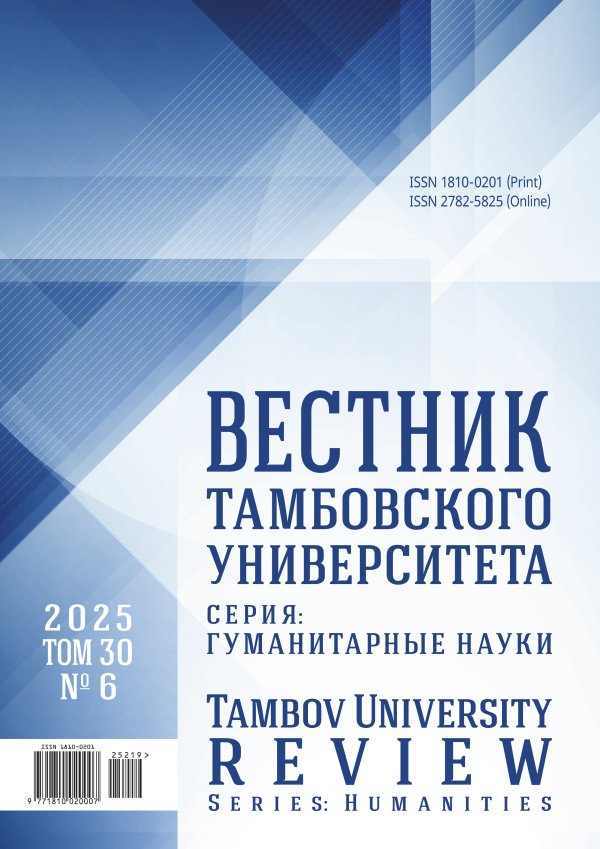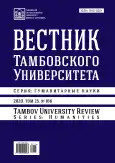Этапы формирования коллокационной компетенции студентов на основе лингвистического корпуса
- Авторы: Клочихин В.В.1
-
Учреждения:
- ФГБОУ ВО «Тамбовский государственный университет им. Г.Р. Державина»
- Выпуск: Том 25, № 186 (2020)
- Страницы: 14-24
- Раздел: ТЕОРИЯ И МЕТОДИКА ОБУЧЕНИЯ ИНОСТРАННОМУ ЯЗЫКУ
- URL: https://bakhtiniada.ru/1810-0201/article/view/298622
- DOI: https://doi.org/10.20310/1810-0201-2020-25-186-14-24
- ID: 298622
Цитировать
Полный текст
Аннотация
Рассмотрено понятие лингвистического корпуса текстов. Проведен краткий экскурс по работам предыдущих исследователей, посвященным использованию лингвистического корпуса текстов в обучении иностранному языку. Благодаря структурности и спланированному характеру проектной деятельности метод проектов выбран в качестве средства формирования коллокационной компетенции на основе лингвистического корпуса текстов. Дано определение метода проектов и обозначены его особенности. На основе методической литературы рассмотрены этапы реализации проектной деятельности. Проведен анализ исследований, в которых представлены этапы и шаги алгоритмов обучения различным аспектам иностранного языка. Разработан авторский алгоритм формирования коллокационной компетенции на основе лингвистического корпуса текстов, включающий три этапа (подготовительный; процессуальный и заключительный) и десять шагов (ознакомительный; пояснительный; информационная безопасность; поисковый; сортировочный; исследовательский; дискуссионный; коммуникативный; рефлексивный и оценочный). Составлены проблемные языковые задания на развитие коллокационной компетенции.
Об авторах
В. В. Клочихин
ФГБОУ ВО «Тамбовский государственный университет им. Г.Р. Державина»
Автор, ответственный за переписку.
Email: cta124@yandex.ru
ORCID iD: 0000-0003-4845-6624
научный сотрудник лаборатории языкового поликультурного образования
392000, Российская Федерация, г. Тамбов, ул. Интернациональная, 33Список литературы
- O’Keeffe A., McCarthy M.J., Carter R.A. From Corpus to Classroom: Language Use and Language Teaching. Cambridge: Cambridge University Press, 2007. 315 p.
- Сысоев П.В. Лингвистический корпус в методике обучения иностранным языкам // Язык и культура. 2010. № 1 (9). С. 99-111.
- Сысоев П.В. Современные информационные и коммуникационные технологии: дидактические свойства и функции // Язык и культура. 2012. № 1 (17). С. 120-133.
- Чернякова Т.А. Методика формирования лексических навыков студентов на основе лингвистического корпуса (английский язык, языковой вуз): автореф. дис. ... канд. пед. наук. М., 2012.
- Дерябина И.В. Методика обучения учащихся управлению английских глаголов на основе британского национального корпуса (профильный уровень): автореф. дис. … канд. пед. наук. М.: МГГУ им. М.А. Шолохова, 2013.
- Семич Ю.И. Методика обучения студентов направления подготовки «Журналистика» иноязычному письменному высказыванию на основе корпусных технологий: дис. … канд. пед. наук. Тамбов: Тамб. гос. ун-т им. Г.Р. Державина, 2019. 194 с.
- Рязанова Е.А. Методика формирования грамматических навыков речи студентов на основе лингвистического корпуса: английский язык, языковой вуз: автореф. дис. ... канд. пед. наук. М., 2012. 24 с.
- Кокорева А.А. Алгоритм обучения студентов профессиональной лексике на основе корпуса параллельных текстов // Вестник Тамбовского университета. Серия: Гуманитарные науки. 2013. № 3 (119). С. 78-83.
- Клочихин В.В. Формирование коллокационной компетенции обучающихся на основе электронного лингвистического корпуса // Вестник Тамбовского университета. Серия: Гуманитарные науки. Тамбов, 2019. Т. 24. № 179. С. 69-80. doi: 10.20310/1810-0201-2019-24-179-69-80
- Dewey J. How We Think. Lexington: DC Heath, 1910.
- Kilpatrick W.H. The project method // Teachers College Bulletin. 1918.
- Adderley K. et al. Project Methods in Higher Education. Guildford, 1975.
- Полат Е.С., Бухаркина М.Ю., Моисеева М.В., Петров А.Е. Новые педагогические и информационные технологии в системе образования. М.: Изд. центр «Академия», 2005. 272 с.
- Полат Е.С. Метод проектов на уроках иностранного языка // Иностранные языки в школе. 2000. № 2. С. 37-45.
- Сафонова В.В., Сысоев П.В. Элективный курс по культуроведению США в системе профильного обучения английскому языку // Иностранные языки в школе. 2005. № 2. С. 7-16.
- Szállassy N. Project method, as one of the basic methods of environmental education // Acta Didactica Napocensia. 2008. № 2. P. 44-49.
Дополнительные файлы










